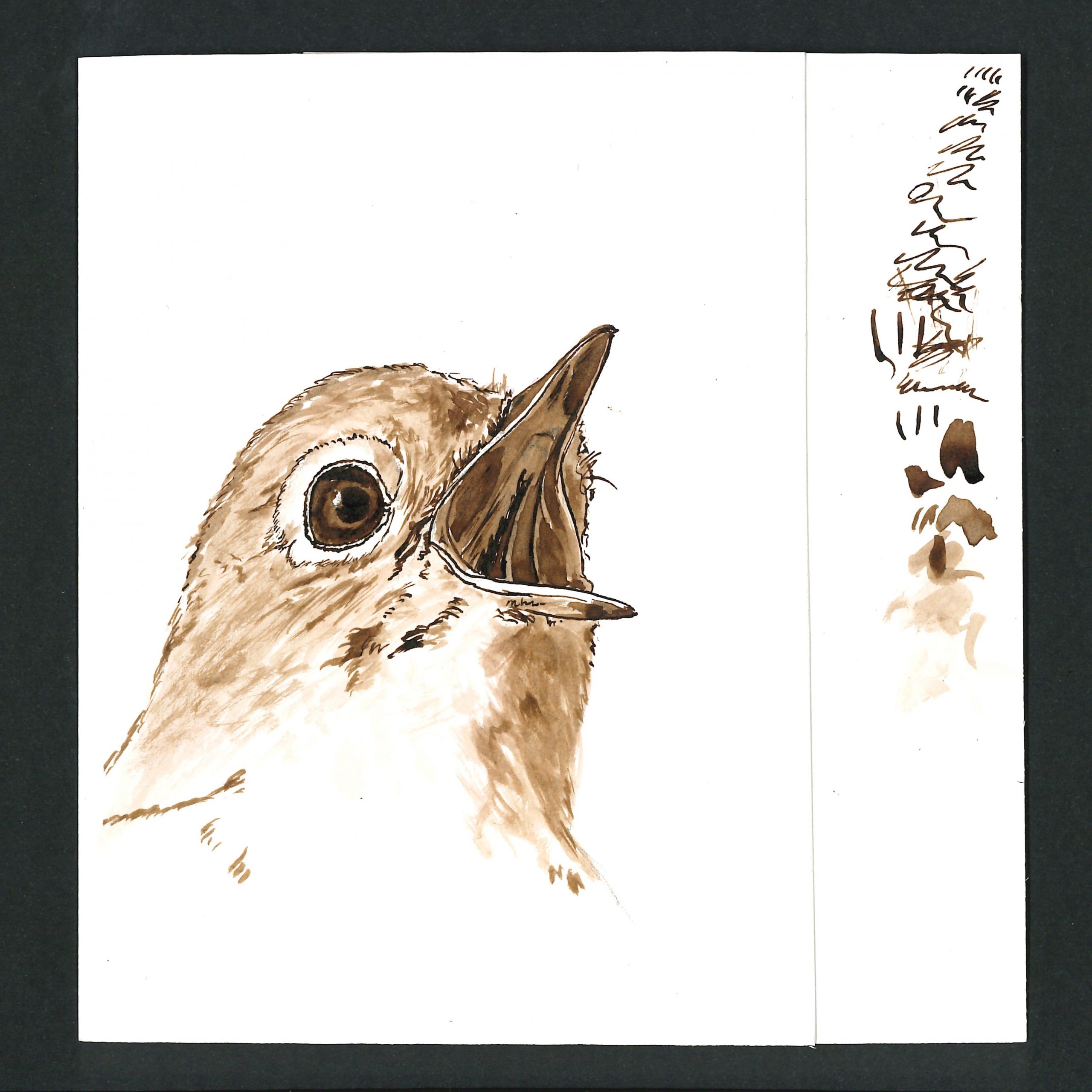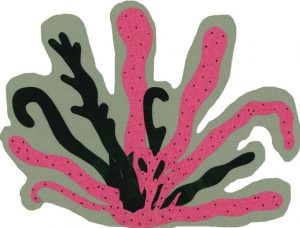
Finding my way back to the nightingale
by Natasha Gargan | May 9, 2022
The exalted song of the nightingale has long haunted the poetic imagination. Though I have never heard a nightingale sing, I have read its lamenting melodies in the lines of Ovid, Keats, and Coleridge. The real song remains elusive, yet somehow still a familiar refrain, and I wonder whether it is possible for me to ever listen without trying to entrap the bird in poetic significance. It was upon an evening in late December that I sought respite from the cold in Foyles. A slim volume of verse was perched at eye-level. It was Jorge Luis Borges, and, poking through with frost-bitten fingers, I happened upon ‘To the Nightingale’. He chronicles the rich literary history of the nightingale, yet seems to yearn (as I do) to hear the bird beyond this cacophony. I left the book behind, but wrote the name of the poem on my hand in black ink.
Imprinted on my hand, the poem outstayed the pen-marks and followed me into the new year. I was troubled by the idea that, “burdened by mythology”, the flight of the nightingale might be constrained by literary chains and that the bird that flew around my mind was the one of literature, not of the forest. For Borges, it is Keats who, amongst these competing melodies, “heard [the nightingale] for all, everywhere”. Keats’ particular nightingale becomes the nightingale. His words preserve the beauty of a fleeting, momentary melody, so that the nightingale is free to sing for all, forever.
But do we really hear the nightingale when we tune into Keats’ melody? Rather than freeing the bird to sing forever, perhaps Keats’ universality imprisons it. Though he admits that he might never have heard it sing, Borges does the same by adding yet another competing strain to the already over-saturated symphony of the nightingale, making it all the more difficult to listen. Even as I hope to hear the nightingale, this act of writing makes me complicit in burdening it, too. These literary endeavours to imitate and celebrate the bird domesticates the vaunted song, and denies it the freedom to be itself, a bird. Do our literary representations accurately capture the true beauty of its song, or have we taught the nightingale to sing to a tune of our own devising?
The burden of mythology entraps the nightingale in a tragedy of violence. In the myth, related in Ovid’s Metamorphoses, Philomela is raped and consequently muted by her sister’s husband, Tereus. Unable to speak, she weaves a tapestry depicting his awful crimes, overcoming her silence and revealing her story to her sister. Together, they wreak a savage revenge and, praying to the gods for protection, are transformed into the nightingale and the swallow. Ever since, the nightingale has been associated with violation and sorrow, and reading these texts teaches us (according to the tradition) how to listen: when we hear the nightingale, we hear the plaintive cry of a violated woman, the birdsong now inextricable from her laments. Whether the nightingale was chosen for its song – the actual melodies provoking sorrow – or its voice has retrospectively acquired the timbre of tragedy, each rendition of the myth performs its own ‘metamorphosis’ in fusing the actual bird with the mythological one. Firmly established in the poetic conscience, the bird is liberated from the temporal chains of mortality. Unlike her body, Philomela – as the nightingale – retains an “inviolable voice”, in the words of Eliot, that continues to sing her plaint through the ages.
Travelling through space and time as a perpetual source of poetic inspiration, the name of Philomela can be found in works from antiquity to modernity. Keats’ ‘Ode to a Nightingale’ sees this into full bloom, though he departs markedly from the mythological interpretation. His nightingale is the immortal voice of poetry made manifest and the lament belongs instead to Keats, who mourns the transience of his mortal voice compared to that of the bird:
Thou wast not born for death, immortal Bird!
No hungry generations tread thee down;
The voice I hear this passing night was heard
In ancient days by emperor and clown
Unlike the mythologically burdened bird that Borges describes, Keats’ nightingale cannot be “tread down” by literary weight because the same eternal song flows into human ears, without regard for time, place and status, without regard even for the inevitable deaths of the author and audience. The poetic voice of man cannot hope to match, nor adequately honour, the music. This is the song that I have hoped to hear, lofty and distinctly inhuman, evading the reaching grasp of my mind whilst lifting me momentarily to the heights of its beauty. The nightingale itself, of course, has no pretensions to these heights, no knowledge of its literary burden: it simply exists, and Keats caught a snippet of song on the wind before it was carried away. The momentary nature of the melody is what unites all listeners across all time, together.
Yet, despite the inadequacy of language to match birdsong, he writes, and in writing a poem his words become his memory. Even when we try to be faithful to the moment, writing is always revising memory, and, since we are not infallible observers, something must always evade the pen. Elusive and enchanting, birdsong is beyond words and cannot be truly imitated or contained by them. We can imagine the nightingale’s voice suddenly raining down upon Keats, then drifting away, echoing through the valley. We do not want beautiful moments like these to slip away from us forever, and the impulse to preserve them and carry them with us – as I did with Borges’ poem – prompts us to take photos, write, reminisce. Enraptured, Keats the man clearly venerated the beauty of the momentary song. Keats the poet more damningly imprisons it through the very act of writing. Though bringing elucidation and clarity, language must also destroy a part of that which we seek to understand by pinning it down in a sort of literary taxidermy. As he writes, he stamps himself onto the sound, using it as an invitation to reflect on “the weariness, the fever, and the fret” of his own existence. The nightingale is forcibly silenced in favour of his own song, and the mastery of his rendition secures his own literary immortality. The nightingale is fuel for the flames of poetry, and is burnt up by the splendour of his genius.
Though Keats writes to ‘a’ particular nightingale, his writing means that Borges can write to ‘the’ nightingale. The shift is telling: there is only one nightingale that Borges can invoke, and it is the chimeric product of the many representations that have come before. His nightingale is global, crossing territories and times, yet still an “enigma” formed of “shadows”. Whilst the song of the Keatsian nightingale is perfectly clear, Borges’ “unknowing ear” remains, despite – or even because of – the flood of literary attempts to translate its beauty. Borges allows the real nightingale to remain silent: “perhaps I never heard you.” In permitting the silence, he begins to find his way back to the real nightingale by granting it the freedom to remain elusive, silent, and finally “burn with love and die melodiously”.
Still, like Keats, he writes. The nightingale is forced to sing again, but it is the silence in his rendition that struck me. Reading Borges allowed me to see both types of beauty at once, that of the literary nightingale and that of the unarticulated moment: they need not be in competition. Last year, I took up wild swimming. It was in the river that I first felt this tension between the literary and the real. The brute cold of the water would electrify me back into myself and suspend my capacity to think until there was only stillness. These moments of disarming wonder resist the understanding that proceeds from articulation. It must be experienced, and though it can be preserved forever in language, it loses a certain lustre in the process. But I wanted to tell everyone about it. I wanted to write and talk and stretch the moment out as long as I possibly could. I thought I was gaining some new understanding, but maybe I was just alienating myself from the experience I hoped to get closer to.
Borges’ duality of mortality and immortality, literary and actual, reminded me of the river. In finding my own way back to the nightingale, this feels like the right place to start. Part of me could happily stay in the river, but it will quickly grow too cold and my body will demand warmth and life will crook a finger, demanding me to return. Yet my mind can revisit the moment in the sanctuary of memory, of imagination. The birdsong too must come to a close, and though articulation is destructive, it is all we have to preserve beauty as it flees. In acknowledging the literary labyrinth built around the bird, Borges catches a glimpse of the elusive and the familiar, the bird and the idea of the bird. In giving both the opportunity to sing, he transcends their difference, and the beauty of both nightingales remains intact, even working symbiotically to enhance each other. His accomplishment is that, for the brief time of reading, we can revisit the momentary song of the nightingale.
Now when I walk, I listen. I’d like to know the song of the nightingale when I hear it. But perhaps the only way to escape the literary burden is to remain ignorant. When Keats’ “plaintive anthem” flows and dances upon the wind, my “unknowing ear” will let me remain unencumbered and free to simply listen. Or will I recognise the notes of lament, the very same strain that provoked our literary fixation? I hope that whenever I do hear the nightingale, whether knowingly or not, I can hear the song and become buoyant on the beauty of the moment, before letting it “die melodiously” like Borges, and carrying the sound of the song with me, imprinted not on my hand this time but in my memory.∎
Words by Natasha Gargan. Art by Oliver Roberts.




